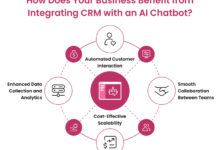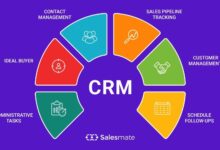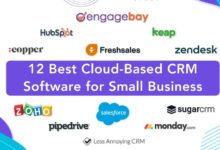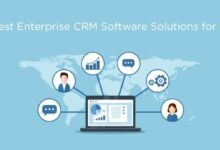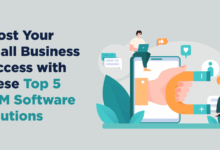Affordable CRM Software for Startups
Affordable CRM Software for Startups is crucial for early-stage businesses navigating limited budgets. Finding the right balance between cost-effectiveness and essential features is key to maximizing return on investment. This guide explores various affordable CRM options, helping startups select the perfect tool to streamline sales, marketing, and customer support processes, fostering growth without breaking the bank.
We’ll delve into defining “affordable” within the context of different startup funding stages, examining pricing models and hidden costs. Key features essential for startups will be highlighted, along with a step-by-step guide to software selection and implementation. Data management, security, and scalability considerations will also be addressed, ensuring a future-proof CRM strategy. Finally, we’ll showcase illustrative examples of affordable CRM solutions tailored to various startup types.
Defining “Affordable” for Startups
The definition of “affordable” CRM software for startups is highly dependent on the company’s stage of development and its available resources. What constitutes a reasonable investment for a seed-stage startup will differ significantly from a Series B company with established revenue streams. Understanding this nuanced perspective is crucial for selecting the right tool without overspending or compromising on essential features.
Budget Considerations Across Startup Stages
Startups typically operate on tight budgets, making cost a primary factor in CRM selection. Seed-stage companies often prioritize free or very low-cost options, focusing on basic functionality to manage initial customer interactions. As they progress to Series A and beyond, their budgets may expand, allowing for more sophisticated solutions with advanced features. However, even at later stages, cost-effectiveness remains a key concern. A general guideline might be:
Seed Stage: $0 – $50/month (often relying on freemium models or extremely limited paid plans).
Series A: $50 – $250/month (allowing for more features and users).
Series B and beyond: $250+/month (potentially including enterprise-level features and integrations). This range can increase substantially depending on the size of the sales team and the complexity of the CRM requirements.
CRM Software Pricing Comparison
The following table provides a simplified comparison of pricing tiers across several popular CRM options. Note that pricing can vary based on features, add-ons, and the number of users. These figures are illustrative and should be verified with the respective software providers.
| Software Name | Pricing Tier | Monthly Cost (USD) | Key Features |
|---|---|---|---|
| HubSpot CRM | Free | $0 | Contact management, deal tracking, basic reporting |
| Zoho CRM | Standard | $14 | Contact and lead management, sales pipeline management, basic automation |
| Salesforce Sales Cloud | Essentials | $25 | Salesforce’s core features, lead management, opportunity tracking, reporting and analytics |
| Freshsales | Growth | $29 | Sales pipeline management, email integration, phone integration, basic automation |
| Pipedrive | Professional | $49 | Advanced features such as sales forecasting and custom reports. |
Hidden Costs of CRM Implementation
Beyond the subscription fee, several hidden costs can significantly impact the overall investment in CRM software. These include:
* Implementation Costs: Setting up the CRM, customizing it to your business needs, and migrating existing data can require significant time and effort, potentially necessitating external consultant assistance.
* Training Costs: Proper training for your sales and marketing teams is essential to ensure effective CRM usage. This may involve internal training sessions or external consultants.
* Integration Costs: Integrating the CRM with other essential business tools (e.g., marketing automation, accounting software) can incur costs for development or third-party integration services. The cost can vary greatly depending on the complexity of the integration.
Value Proposition of Different Pricing Models
Different pricing models offer varying value propositions for startups.
* Freemium: Freemium models offer a free version with limited functionality, often attracting startups with limited budgets. However, limitations can restrict growth and scalability. A good example is HubSpot CRM’s free plan, suitable for smaller startups with basic needs.
* Tiered Subscriptions: Tiered subscription models offer different feature sets at varying price points, allowing startups to choose a plan that aligns with their current needs and budget. They provide flexibility to upgrade as the business grows. Most of the CRMs listed above use this model.
* Per-User Pricing: Per-user pricing models charge based on the number of users accessing the CRM. This is cost-effective for smaller teams but can become expensive as the team grows.
Key Features for Startup CRM Software
Choosing the right CRM is crucial for a startup’s growth. A well-integrated system streamlines operations, improves customer relationships, and ultimately drives revenue. This section outlines essential CRM features for startups focusing on sales, marketing, and customer support, highlighting their functionalities and comparing popular options.
Essential CRM Features for Startups
Startups need a CRM that’s both powerful and easy to use. Overly complex systems can be counterproductive. The following features are critical for efficient operations and scaling:
- Contact Management: A robust contact database is fundamental. This allows for centralized storage and easy access to all customer information, including contact details, interaction history, and purchase records. Effective contact management streamlines communication and personalization efforts, crucial for building strong customer relationships.
- Lead Tracking: This feature allows startups to monitor the progress of potential customers through the sales funnel. It provides insights into lead sources, engagement levels, and conversion rates, enabling data-driven decision-making and optimizing sales strategies. Real-time tracking is particularly valuable for agile responses to potential customer needs.
- Sales Pipeline Management: Visualizing the sales process through a pipeline helps startups track deals at different stages, identify bottlenecks, and forecast revenue. This allows for proactive management of sales activities and resource allocation, ultimately improving sales efficiency and predictability. A clear visual representation facilitates better team collaboration and accountability.
- Email Marketing Integration: Seamless integration with email marketing platforms enables targeted email campaigns, automated follow-ups, and personalized communication. This enhances customer engagement, nurtures leads, and boosts conversion rates. The ability to track email open and click-through rates provides valuable data for refining marketing strategies.
Comparison of CRM Feature Functionality
Several popular CRM features offer similar functionalities but with varying degrees of sophistication and integration.
- Contact Management: Basic contact management systems simply store contact details. More advanced systems offer features like segmentation, custom fields, and integration with other business tools (e.g., calendar applications). The difference lies in the level of detail and automation offered.
- Lead Tracking: Simple lead tracking involves manual entry and basic reporting. Advanced systems automatically capture lead information from various sources, score leads based on predefined criteria, and provide detailed analytics on lead behavior and conversion rates. The level of automation and data analysis significantly impacts efficiency.
- Sales Pipeline Management: Basic pipeline management provides a simple visual representation of the sales process. Advanced systems allow for customization of pipeline stages, automated task assignments, and real-time progress tracking. Advanced features enhance team collaboration and provide more granular insights into sales performance.
- Email Marketing Integration: Basic integration might simply allow sending emails from within the CRM. Advanced integration enables automated email sequences, personalized email content based on customer data, and detailed tracking of email performance. The level of automation and personalization directly impacts marketing ROI.
Sample Startup CRM Dashboard
A well-designed dashboard provides a quick overview of key performance indicators (KPIs). Here’s a sample dashboard tailored to a startup’s needs:
| Metric | Description | Purpose |
|---|---|---|
| Total Leads | Number of new leads generated within a specified period. | Track lead generation effectiveness. |
| Qualified Leads | Number of leads meeting pre-defined criteria (e.g., budget, need). | Assess lead quality and sales potential. |
| Conversion Rate | Percentage of leads converting into customers. | Measure sales efficiency and identify areas for improvement. |
| Average Deal Size | Average revenue generated per closed deal. | Track revenue growth and pricing strategies. |
| Customer Churn Rate | Percentage of customers who stopped using the product/service. | Identify customer satisfaction issues and retention strategies. |
| Customer Lifetime Value (CLTV) | Predicted revenue generated by a customer over their entire relationship. | Prioritize high-value customers and optimize customer acquisition costs. |
Software Selection and Implementation
Choosing and implementing the right CRM software is crucial for a startup’s success. A well-integrated system streamlines operations, improves customer relationships, and ultimately drives growth. However, the process requires careful consideration of various factors, from budget constraints to team capabilities. This section outlines a structured approach to navigate this critical phase.
Evaluating and Selecting Affordable CRM Software
A systematic approach is vital for choosing the best affordable CRM. This involves defining your needs, researching options, and comparing features and pricing. The following steps provide a structured framework for this process.
- Define Your Requirements: Begin by identifying your startup’s specific needs. Consider the size of your customer base, the complexity of your sales process, and the key metrics you want to track (e.g., lead conversion rates, customer lifetime value). A clear understanding of your requirements will help you narrow down your options.
- Research and Shortlist Potential Software: Explore various CRM options, focusing on those that align with your budget and feature requirements. Read reviews, compare pricing plans, and check for integrations with your existing tools. Consider both cloud-based and on-premise solutions, weighing the pros and cons of each.
- Conduct a Thorough Comparison: Create a comparison table to evaluate the shortlisted CRM options. Include factors such as pricing, features, ease of use, customer support, security, and scalability. Prioritize features based on your identified needs, assigning weights to each factor to facilitate a more objective comparison.
- Trial and Test the Software: Most CRM providers offer free trials or demos. Take advantage of these opportunities to test the software’s functionality and usability within your team. Involve key users in the testing process to gather diverse perspectives.
- Make an Informed Decision: Based on your research, comparison, and testing, select the CRM software that best meets your needs and budget. Consider the long-term implications of your choice, ensuring the software can scale with your business’s growth.
Integrating a CRM System with Existing Business Tools
Seamless integration with existing tools is vital for maximizing the value of your CRM. This avoids data silos and ensures a unified view of your customer interactions.
For example, integrating your CRM with your email marketing platform allows for automated email campaigns triggered by specific customer actions within the CRM. Similarly, integrating with accounting software streamlines invoicing and payment processing, providing a complete picture of your customer’s financial interactions.
The integration process typically involves using APIs (Application Programming Interfaces) or third-party integration tools. Many CRM providers offer pre-built integrations with popular business tools, simplifying the process. However, custom integrations might be necessary in some cases, requiring technical expertise or the assistance of a consultant.
Implementing a CRM System Within a Small Startup Team
Implementing a CRM system in a small startup presents unique challenges. Limited resources, time constraints, and a lack of dedicated IT support can hinder the process.
Addressing these challenges requires a well-defined implementation plan, clear communication, and adequate training. Start with a pilot program involving a small group of users to test the system and identify potential issues. Provide comprehensive training to ensure all users understand the system’s functionality and best practices. Establish clear roles and responsibilities for data entry and maintenance. Regularly monitor the system’s performance and make adjustments as needed.
Overcoming resistance to change is also crucial. Emphasize the benefits of the CRM system to team members, addressing their concerns and providing ongoing support. Celebrate early successes to build momentum and encourage adoption.
Data Management and Security
Protecting your customer data is paramount, especially for startups. A robust data management and security strategy isn’t just a good idea; it’s a necessity for maintaining customer trust, complying with regulations, and avoiding potentially devastating legal and financial repercussions. This section will outline key aspects of data security and integrity within the context of affordable CRM systems for startups.
Data security and privacy are critical for startups handling sensitive customer information. Breaches can lead to significant financial losses, reputational damage, and legal penalties. For example, a small e-commerce startup experiencing a data breach might face fines under GDPR or CCPA, alongside the loss of customer trust and potential legal action. Protecting this data requires a multi-faceted approach encompassing technical, procedural, and legal safeguards.
Data Integrity and Backup Procedures
Maintaining data integrity ensures the accuracy and consistency of your customer information. This is crucial for accurate reporting, effective marketing, and providing a positive customer experience. Regular data backups are equally important, serving as a safety net against data loss from various causes, including hardware failure, software glitches, or even malicious attacks. A comprehensive backup strategy should involve regular, automated backups to both local and offsite storage, employing a version control system to track changes and enable easy restoration. For example, a startup might use a cloud-based backup service alongside regular local backups to a separate hard drive. This dual approach mitigates the risk of data loss from a single point of failure.
Data Protection Regulation Compliance Checklist
Prioritizing compliance with data protection regulations is essential for any startup. Failure to comply can result in substantial fines and legal ramifications. A proactive approach to compliance involves understanding the relevant regulations (such as GDPR, CCPA, etc.) and implementing appropriate measures to meet their requirements. A compliance checklist might include:
- Data Minimization: Only collect the data absolutely necessary for your business operations.
- Data Security: Implement robust security measures, including strong passwords, encryption, and access controls.
- Data Retention Policies: Define clear policies on how long you retain customer data and how it’s securely disposed of when no longer needed.
- Consent Management: Ensure you have documented consent from customers for collecting and using their data.
- Data Breach Response Plan: Develop a detailed plan to address data breaches, including notification procedures and mitigation strategies.
- Employee Training: Train employees on data protection policies and procedures.
- Regular Audits: Conduct regular audits to assess compliance and identify areas for improvement.
This checklist is not exhaustive, and the specific requirements will vary depending on your location and the type of data you handle. Consulting with legal professionals specializing in data protection is strongly advised.
Scaling and Future-Proofing
Choosing a CRM system that can grow with your startup is crucial for long-term success. A system that works well for a team of five might become a bottleneck as you expand to fifty. Future-proofing your CRM involves selecting a solution adaptable to your evolving business needs and capable of integrating with other essential tools.
Scalability in a CRM refers to its ability to handle increasing amounts of data, users, and functionalities without significant performance degradation. This includes aspects like data storage capacity, user management capabilities, and the system’s overall architecture. A cloud-based solution generally offers better scalability than an on-premise system due to its inherent flexibility and readily available resources.
Choosing a Scalable CRM System
Several factors determine a CRM’s scalability. Consider the system’s architecture (cloud-based is generally more scalable), its capacity for handling large datasets, and the vendor’s track record of supporting growing customer bases. Look for features like customizable workflows, user roles and permissions, and robust reporting capabilities to accommodate a larger team and more complex processes. A system with a proven history of supporting rapid growth in other startups will offer greater confidence. For example, a company that initially used a simple spreadsheet to manage customer interactions might transition to a cloud-based CRM like HubSpot or Zoho CRM as their customer base grows, allowing them to handle increasing volumes of data and more complex workflows. Another example could be a startup using a smaller, less feature-rich CRM like Pipedrive, scaling to Salesforce as they achieve significant growth and require more advanced functionalities like sales forecasting and custom reporting.
Adapting CRM Strategy with Business Evolution
As a startup evolves, its CRM strategy must adapt. Initially, a focus on lead generation and basic customer management might suffice. However, as the company grows, the CRM might need to incorporate functionalities for sales forecasting, marketing automation, customer service ticketing, and more. This evolution might involve adding new modules or integrating with other software. For instance, a startup might start using its CRM primarily for contact management. As it expands its product line, it may integrate e-commerce functionalities to track sales and inventory. Further growth could necessitate integration with marketing automation platforms for targeted campaigns and customer segmentation.
The Importance of API Access
API (Application Programming Interface) access is critical for future-proofing your CRM. A robust API allows seamless integration with other business tools, such as marketing automation platforms, e-commerce systems, and accounting software. This integration creates a unified view of customer data and streamlines workflows. Without good API access, you risk creating data silos and hindering efficiency. For example, a startup using a CRM with a strong API can easily integrate it with its email marketing platform to automate email sequences based on customer interactions within the CRM. Another example could be integrating the CRM with a project management tool to track customer projects and deadlines, ensuring a cohesive workflow across different departments.
Illustrative Examples of Affordable CRM Solutions
Choosing the right CRM can significantly impact a startup’s growth. The market offers various options, each with its strengths and weaknesses. This section examines three affordable CRM solutions suitable for different startup types, emphasizing their core functionalities and potential limitations. Consider your specific needs and budget when evaluating these options.
Affordable CRM Software Options: Descriptions and Comparisons
Several affordable CRM solutions cater to the needs of startups. The following descriptions provide insights into their functionalities and suitability for various business models. Remember that pricing can fluctuate, so always check the vendor’s website for the most up-to-date information.
HubSpot CRM
HubSpot CRM offers a robust free plan, making it an attractive option for bootstrapped startups. Its strengths lie in its user-friendly interface, extensive automation capabilities, and seamless integration with other HubSpot tools (should the startup decide to scale later). It excels in contact management, email marketing, and basic sales pipeline tracking. However, the free plan has limitations on the number of users and contacts, and more advanced features require a paid subscription. For larger startups or those requiring more sophisticated reporting, the paid plans are necessary, though still relatively affordable compared to enterprise-level solutions.
A SaaS startup could utilize HubSpot CRM to manage customer interactions, track software trial usage, and nurture leads through automated email sequences. An e-commerce startup could use it to manage customer data, personalize marketing emails, and track sales conversions. A service-based startup, such as a consulting firm, could leverage it to manage client projects, track communication, and send follow-up emails.
Zoho CRM
Zoho CRM is a comprehensive solution offering a range of plans to suit various budgets. Its strength lies in its versatility and extensive feature set, including sales force automation, customer support tools, and marketing automation capabilities. It provides a robust reporting and analytics dashboard. However, its interface can be perceived as less intuitive than HubSpot’s, requiring a steeper learning curve. The free plan is quite limited, and unlocking the full potential often necessitates upgrading to a paid plan.
A SaaS startup might use Zoho CRM to manage customer onboarding, track feature requests, and analyze customer churn. An e-commerce startup could leverage its inventory management features, automate order processing, and personalize customer communication. A service-based startup, like a design agency, could utilize Zoho CRM to manage client projects, track timelines, and maintain communication logs.
Freshsales CRM
Freshsales CRM presents a compelling alternative with a focus on sales pipeline management and automation. Its strengths lie in its clean and intuitive interface, powerful sales automation features, and competitive pricing. It offers good integration options with other business tools. However, some advanced features, such as complex reporting and analytics, might require add-ons or higher-tier subscriptions. Its marketing automation capabilities are less extensive than those offered by HubSpot or Zoho.
A SaaS startup could employ Freshsales to track sales demos, manage deals, and automate follow-up emails. An e-commerce startup could use it to manage customer interactions, track sales orders, and streamline the sales process. A service-based startup, such as a freelance writing agency, could use Freshsales to manage client projects, track invoicing, and improve client communication.
Comparison Table
| Software Name | Price | Strengths | Weaknesses |
|---|---|---|---|
| HubSpot CRM | Free plan available; paid plans starting at a low cost per user | User-friendly interface, strong automation, good integrations | Free plan limitations, some advanced features require paid plans |
| Zoho CRM | Various plans available, including affordable options | Versatile features, robust reporting, extensive functionality | Steeper learning curve, free plan very limited |
| Freshsales CRM | Competitive pricing, various plans available | Intuitive interface, powerful sales automation | Limited advanced reporting and analytics in lower-tier plans, less extensive marketing automation |
Conclusion
Selecting the right affordable CRM software is a pivotal decision for startups. By carefully considering factors such as pricing, essential features, scalability, and data security, startups can leverage CRM technology to drive growth and enhance customer relationships without overspending. Remember to prioritize features aligned with your specific business needs and choose a solution that can adapt as your company evolves. The right CRM can be a powerful engine for sustainable startup success.
